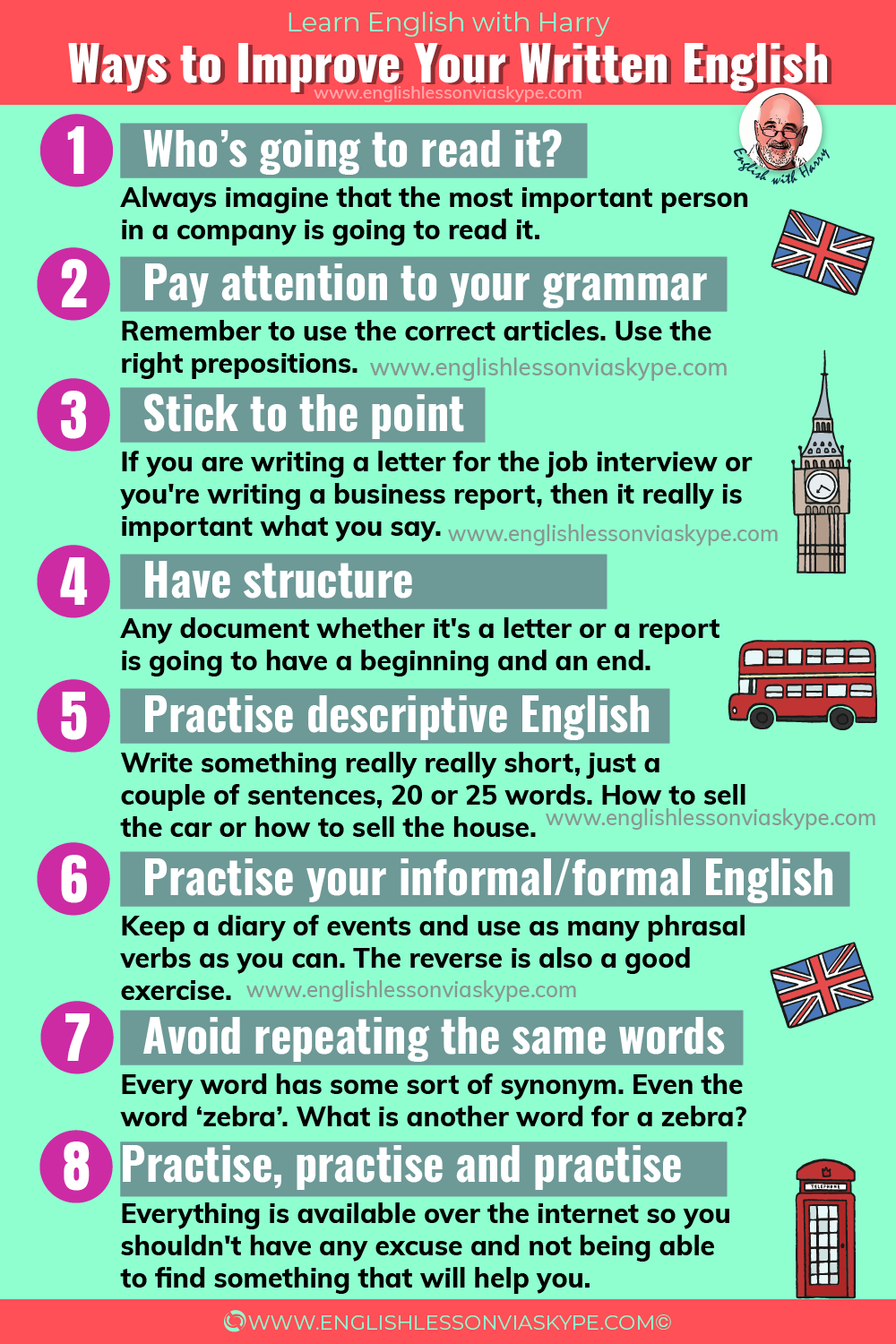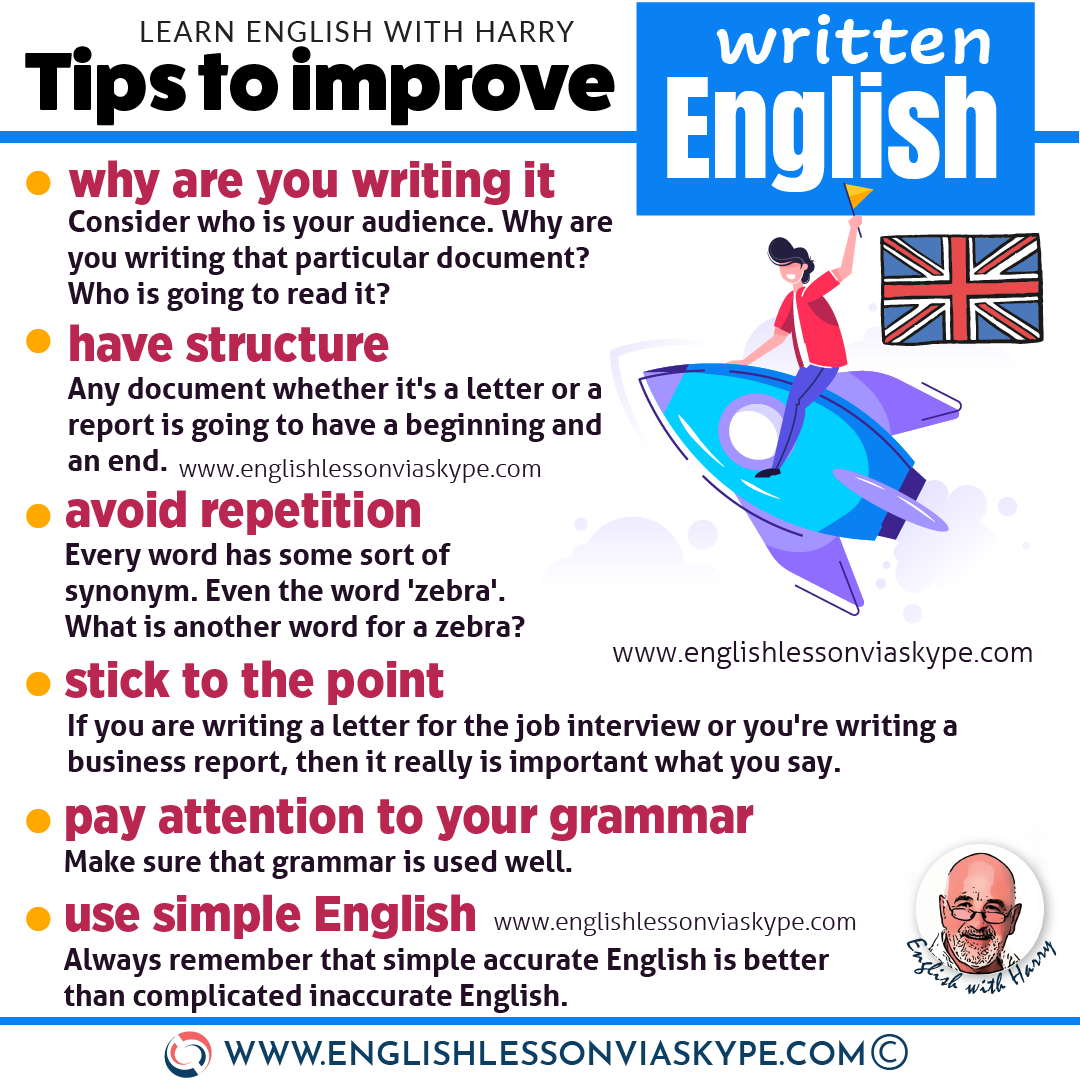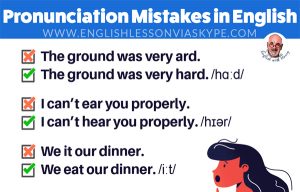Do you want to improve your written English?
Today, I want to talk to you about ways to improve your written English and improve your confidence in writing. In the previous lesson, I shared with you my 10 Real Tips for Improving English
and one of those (there were 10 tips) and one of those tips was to improve your written English.
So that’s what I want to focus on today. Obviously, written English is really important because there are two key ways in which we communicate with other people. How we speak and then also how we write.
Tips for improving written English
Harry
11 Simple Ways to Improve Your Written English

Transcript
Why are you writing it?
And when we are writing English, it can be in many many different formats. So think now about how you write in the last couple of days or what you write in the next few days.
It could be something as simple as just a text on your phone.
It could be a WhatsApp message.
It could be an email replying to a business colleague or some customer.
It could be a much more detailed report for your boss for new business proposals.
Or, indeed, it could be that all-important letter for that new job application, that job that you really want.
So in all of those aspects, we have to really think about the type of English that we’re writing and why we are writing it.
Intermediate to Advanced English Marathon

INSANITY: doing the same thing over and over again and expecting different results.
Albert Einstein
- What you'll learn:
- better understanding of more complex grammar structures
- advanced English vocabulary words
- British & American slang
- perfect your listening skills through practing different accents
- This marathon is for you if you're:
- stuck at an intermediate English level
- tired of confusing explanations
- a mature student
- shy & introverted
For example, if it’s your friend’s birthday and you’re sending them a birthday card you might not think too long and hard about the birthday wishes. Particularly if you’ve seen your friend quite recently.
It might just be very quick:
‘Hi happy birthday, wish you the best lots of love.’
Something as simple as that.
Or if you haven’t seen the person for a long time you can say:
‘Oh I’m really sorry, I haven’t been in touch but I never forget your birthday. I’d like to wish you all the best on this really special day.’
So you might put in a little bit of extra thought into that so it depends on the circumstances.
But if you’re writing that all-important letter for a job interview, you’re going to really want to think about it.

Who are you writing to?
What are they looking for? How do you want to put yourself forward? How does your CV look?
And therefore you want to write a letter that’s going to attract attention and hopefully get you onto that original list. Or indeed onto the shortlist for the job application.
So it’s really really important when you write that you consider who is your audience.
- Who are you writing to?
- Who’s going to read it?
- Why are you writing that particular document?
Is it to impress the boss so therefore you want to maybe put the language a little bit more sexy or little jazz it up a little bit.
Or you want to write the job interview letter and you really want to let them know that you’re the best person that they can possibly hire.
Or indeed it was just an email to your friend and you want to be a little funny and you want to put in a little joke. Well, then obviously the content will differ. Okay.
So as I said, there are two really important things you have to look out for:
- who is going to read your document, your letter, your email
- why are you writing it
And if I’m writing a report, a business report I want to imagine it’s the most important person in that organisation that’s going to read it.
My chief executive, the director, the head of sales, whoever it might be, it has to be the most important person.
You’ll focus a lot more on that. And then if I’m looking at why am I writing it, never stray away from the reason. Don’t fill your document to your boss full of bullshit. They’ll see it through that.
You want to make it concise and accurate and to the point. So be very very careful about who is going to read it.

Ways to Improve Your Written English
Pay a lot of attention to your grammar
If you’re writing an English exam, for example, if you’re doing an IELTS, the examiners don’t really care what your comments are, what your points of view are. What they are examining is how you use English. Okay.
So whether you agree or disagree with the point is not so relevant, it’s not so important but what is important is the structure and the use of English.
So you’ve got to pay an awful lot of attention there to your grammar.
You have to make sure that:
- the use of the articles a, the and an is accurate
- you use the right prepositions
Stick to the point
However, if you are writing a letter for the job interview or you’re writing the business report as we mentioned, then it really is important what you say.
So if you’re writing the letter for the job application, stick to the point.
- What is the job?
- What are they looking for?
- How do you fit into that particular job description?
And don’t waffle because that might lose you some sort of an attraction and therefore might not make you to the shortlist after all.
Of course, in any particular type of English, it’s really important that our grammar is checked. Make sure that grammar is used well.
I cringe when I get documents that are written badly.
So you can imagine that other people who have to read lots and lots of documents every day, lots and lots of CVs and lots and lots of letters for jobs they get a little bit browned off and annoyed if there are a lot of mistakes.
So I’m not just talking about simple typos. We all make those. Even I make those occasionally if I rush an email a little bit. And when I look at it later on ‘Oh god, I’ve got a typo in there.’
That’s not really so bad because it can be an excuse for your typing. If it’s like me with two fingers.
But if you make bad English mistakes, that’s a lot lot different.
That’s not just a typo, that’s bad grammar. So be really really careful with that.
Ways to Improve Your Written English

Get someone to check it
So a tip if you’re preparing a document, particularly an important document that’s going to go to somebody very important and very senior, make sure you get someone to proof it or someone to check it.
So if you’re not a proficient English speaker or writer, get somebody who is. It’s worth spending a bit of money or a bit of time to get them to read it and a fresh pair of eyes makes a huge difference.
Copy what people do
One thing, of course, that will really help you to improve your written English is to see what other people do. So look to the experts.
Look up documents and good business magazines. If it’s a business article you want to write, look up good authors of written English that you can look at sentence construction. You can follow and copy what people do.
There’s no end to the number of books you can find. And you can find very good English construction. You can look at how people make simple and complex sentences and you can copy that sort of style and get used to it. So it’s really really good practice.
So there are so many articles out there. Everything is available over the internet so you shouldn’t have any excuse and not being able to find something that will help you. And it’s a really good part of your own personal training. I did it and I still do it. I like to read other people’s styles to see how they construct sentences, how they use words and everything connected with that.
So make sure that you practise and practise and practise.
Ways to Improve Your Written English
Practise your informal writing
Here are some simple exercises that I carry out with my students when I’m getting them to do written exercises. If they’re trying to understand let’s say phrasal verbs.
Everybody asks me about ‘Oh how can I learn phrasal verbs? I see that everybody gets examined on these. I don’t know how to use them and not comfortable with them.’
Well, one of the simple exercises that I use with my students, I get them to keep a diary of events that happen over a couple of days. A weekend is a good example. Saturday and Sunday.
And I ask them to write in the diary what they did but use as many phrasal verbs as they can.
For example, on Saturday morning I got up, I jumped into the shower, I jumped out of the shower, I ran down the stairs, I put on the coffee, I took out the eggs from the fridge and I put them on the stove.
So we go on and on like that and if you play this back you’ll see that I’ve used six, seven, eight phrasal verbs in a few small sentences.
So it’s a really really good practice and it goes on throughout the morning, the afternoon and the evening to see where you can fit in a phrasal verb.
Practise your formal writing
And the reverse is also a good exercise.
Where I get somebody to write something a little bit more formal without any phrasal verbs. So here what we’re looking for a much more formal verb. So every phrasal verb has a formal verb.
So you can practise your formal writing and you can practise your informal writing in two very easy exercises.
Practise descriptive English
Another example that I use is to get somebody to write something really really short, just a couple of sentences, 20 or 25 words. How to sell the car or how to sell the house.
This is really getting you to use descriptive English with very very few words. You want to get as few words as possible to be as descript as possible. So that you can get somebody to buy the article that you want to sell.
If you want to sell you a car: low mileage, beautiful car, well-maintained, one careful owner, yours for twenty thousand euro.
So descriptive. Not another load of waffle but just very very few words, so it’s a good way to practise descriptive English.
And you can do that in terms of selling the car, selling your home, a visit to a hotel, visit to the zoo, whatever activities that you have get people to be really really descriptive.

Avoid repetition
One of the real problems with people who have or consider themselves to have poor written English skills is that they repeat the same word over and over again. And that can be apart from annoying, it shows in an examination that they have a poor vocabulary, they don’t have an expansive vocabulary. And this is something else that we have to work on and improve with doing some written exercises.
You take a word and you try and find two or three other synonyms that have the same meaning that you can use. So you try and find other verbs with the same meaning of the nouns or the adjectives and so on. Okay.
Every word has some sort of synonym. Even the word ‘zebra’.
So what is another word for a zebra?
- a horse with black and white stripes
- a black horse with white stripes
- a white horse with black stripes
So different ways you can describe your words and those sort of exercises will help you a lot. Try to get your vocabulary expanded so that you’re not repeating the same words time and time again.
Particularly if you’re doing an exam where you’re limited to maybe a hundred and eighty to 230 or 250 words repetition is a problem.
We want to see a wider vocabulary, more words used and not the keywords repeated over and over again.
Ways to Improve Your Written English
Have structure
So when you’re writing, it’s really important to have structure. Any document whether it’s a letter or a report is going to have a beginning and an end. It depends on what type of document as to what type of beginning, what type of middle and what type of end you have.
You have to look up there. But they call the register of the English you’re writing. Is it formal or informal? That will dictate the type of opening the type of the middle and the type of ending that you’re going to have.
If you follow those careful points your documents won’t be too bad.
And again you’re going to go on and practise and practise those to make them as good as you possibly can.
A couple of last points just to give you.
Use simple English
Always remember that simple accurate English is better than complicated inaccurate English.
When your simple English becomes good, then move up to more complex English.
Also, remember when you speak it’s not often remembered unless somebody is recording what you say. But when you write something, it’ll be recorded forever. Particularly in the modern world with the technology that we have. So always be really really careful about what you write. Read it time and time again to get rid of typos or mistakes.
I hope you’ve enjoyed what I’ve had to tell you today and remember as always to subscribe to my channel and join me on www.englishlessonviaskype.com
We’re going to have a really important announcement very soon which I think will be interesting for you.
And if you look down below you’ll get the link to our online English courses.
Lots of wonderful English grammar courses at really reasonable prices.
So join me again very soon and thanks for listening.
You will love these English lessons

12 Idioms Associated with Our Body Parts
Here you will learn 12 more idioms associated with our body parts. To turn a deaf ear, to foot the


8 English Collocations With Pay
Learn useful collocations with pay. Pay the price. Pay tribute to. Pay your regards. And more. Boost your English vocabulary


Common Pronunciation Mistakes in English
Common pronunciation mistakes in English is always a hot topic among ESL students. Of course, in order to be understood
More Information
For more information on English phrasal verbs, English idioms and English grammar rules, check out the following links:
Difference between SO and SUCH
Plenty of intermediate and advanced English learning materials are available at Learning English with the BBC website.
How much time it take to learn full english
It depends. You can get to intermediate level quite comfortably after 12-18 months. If you study and practise every day.